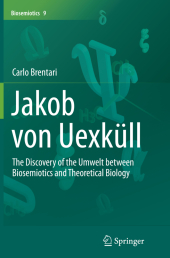 Neuerscheinungen 2016Stand: 2020-02-01 |
Schnellsuche
ISBN/Stichwort/Autor
|
Herderstraße 10
10625 Berlin
Tel.: 030 315 714 16
Fax 030 315 714 14
info@buchspektrum.de |

Carlo Brentari
Jakob von Uexküll
The Discovery of the Umwelt between Biosemiotics and Theoretical Biology
Softcover reprint of the original 1st ed. 2015. 2016. xi, 249 S. 235 mm
Verlag/Jahr: SPRINGER NETHERLANDS; SPRINGER 2016
ISBN: 9402407286 (9402407286)
Neue ISBN: 978-9402407280 (9789402407280)
Preis und Lieferzeit: Bitte klicken
The book is a comprehensive introduction to the work of the Estonian-German biologist Jakob von Uexküll. After a first introductory chapter by Morten T›nnessen and a second chapter on Uexküll´s life and philosophical background, it contains four chapters devoted to the analysis of his main works. They are followed by a vast eighth chapter which deals with the influence Uexküll had on other philosophers and scientists. Finally, the author discloses his conclusions, focused on the possibility of updating Uexküll´s work. As far as the key issue is concerned, the Uexküllian Umwelt is the perceptive and operative world which surrounds animal species; it is a subjective species-specific construction which provides living organisms with great security and behaviour stability. The relationship that the animal carries out with its environment is a complex system of semiotic interactions: its behaviour is not a set of mechanical reactions, but a spontaneous attribution of meaning to the outside world.
Table of Contents
Acknowledgements
Introductory Chapter
1. The life and Education of Jakob von Uexküll
1.1 The First Studies in Philosophy and Science
1.2 Research Trips and Contributions to Physiology
1.3 Arising of Political and Philosophical Interests and the Transition to Theoretical Biology
1.4 The Institut für Umweltforschung in Hamburg
1.5 Frictions with the Nazi Regime and Death
2. The Basis of the Environmental Theory
2.1 Uexküll´s Position in the Mechanist-Vitalist Debate
2.2 Periodization of Uexküll´s Production
2.3 For a Teleological Biology: the Concept of Bauplan
2.4 Towards the Umwelt : the Concept of Milieu
2.5 The Issue of Protoplasm
3. The Subjective World of the Umwelt
3.1 The Origin of the Concept
3.2 The Gegenwelt
3.3 The Re perceived Environment as a Species-specific Transcendental Construction
4. The Structure of the Umwelt
4.1 The Functional Circle
4.2 The Human Observer´s Environment
4.3 The Foundation of Theoretical Biology
4.3.1 Signs in the Environment: the Transcendental Biosemiotics of Uexküll
4.3.2 Towards a Theory of Animal Action
4.3.3 Embryogenesis in Theoretische Biologie
4.3.4 The Origin of Species in Theoretische Biologie
5. Environment and Meaning
5.1 Between Theoretical Biology and Ethology: A Foray into the Worlds of Animals and Humans
5.2 Lines of Action in the Subjective Environment: Operative Images
5.2.1 The Operative Space: Familiar Paths, Home and Territories
5.2.2 Individual Recognition and "Companions" in Social Birds
5.2.3 The Search Tone
5.2.4 Magical Environments
5.2.5 The Environment of Man: the Emergence of Intra-specific Variability
5.3 The Theory of Meaning
5.4 Dialogues on the Biological Vision of the World
5.4.1 The Logic of the Living Being: Plato against Darwin
5.4.2 The Eternal Question: Biology and Personal Immortality
6. Influences and Interpretations of the Work of Uexküll
6.1 Uexküll in XX Century German Philosophical Anthropology
6.1.1 Scheler
6.1.2 Plessner
6.1.3 Gehlen
6.1.4 Cassirer
6.1.5 Langer
6.2 Uexküll in XX Century Philosophy
6.2.1 Heidegger
6.2.2 Ebner
6.2.3 Lacan
6.3.4 Canguilhem
6.2.5 Merleau-Ponty
6.2.6 Deleuze and Guattari
6.3 The Relationship between Lorenz and Uexküll
6.4 Sebeok and Contemporary Semiotics
Conclusion
1. The Formation of the Umwelt: Perceptive Selection or Transcendental Constitution?
2. Vitalism and Teleology in Uexküll
3. Limits and Prospects of the Uexküllian Environmental Theory
References
1. Primary literature
1.1 Works of Jakob von Uexküll
1.2 Works with Jakob von Uexküll as Co-author
2. Secondary literature
2.1. Works about Jakob von Uexküll
2.2 General references
Index


